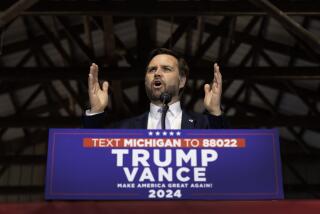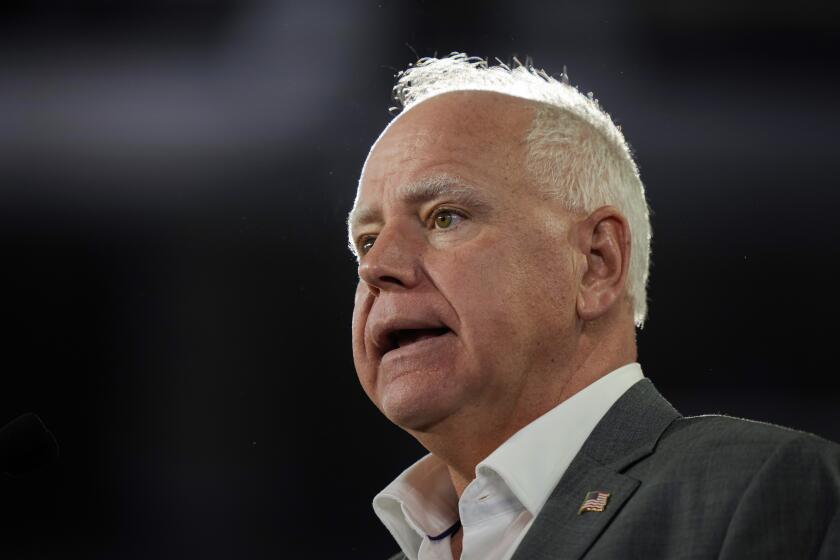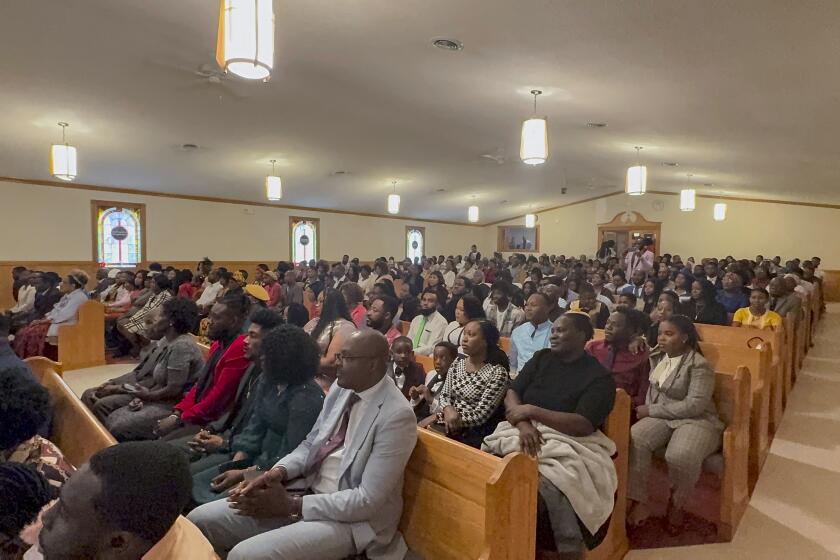Before embracing MAGA, Vance made big money in San Francisco’s tech world

The new Republican vice presidential nominee hangs his proverbial hat on hailing from Middletown, Ohio — a steel mill town in the heart of working-class America.
But for a few years, J.D. Vance joined the world of coastal elites, building a robust venture capitalist career and hobnobbing with some of the wealthiest tech leaders in the Bay Area.
Miles away from his Appalachian upbringing and long before he became former President Trump’s running mate, he was quietly building a Silicon Valley venture capital career and a life in San Francisco.
In an essay for the Atlantic in 2016, he contrasted that reality with conditions in his hometown:
“A few Saturdays ago, my wife and I spent the morning volunteering at a community garden in our San Francisco neighborhood. After a few hours of casual labor, we and the other volunteers dispersed to our respective destinations: tasty brunches, day trips to wine country, art-gallery tours. It was a perfectly normal day, by San Francisco standards.
“That very same Saturday, in the small Ohio town where I grew up, four people overdosed on heroin. A local police lieutenant coolly summarized the banality of it all: ‘It’s not all that unusual for a 24-hour period here.’ He was right: in Middletown, Ohio, that too is a perfectly normal day.”
J.D. Vance, the Ohio senator and author of the acclaimed memoir ‘Hillbilly Elegy,’ will be the Republican vice presidential nominee, former President Trump announces.
The man who would later write the bestselling “Hillbilly Elegy: A Memoir of a Family and Culture in Crisis” — and become a darling of the MAGA right — was in his late 20s when he moved to San Francisco likely around 2013, coinciding with a major boom for Big Tech companies such as Facebook, Google and Twitter. Venture capital firms were also “rolling in money,” said Peter Leyden, founder of Reinvent Futures and host of the AI Age Begins discussion series.
Vance “was here in the absolute boom time of an incredible ride,” Leyden said. “Everybody was gaga about tech.”
The Silicon Valley tech community Vance entered was fairly liberal — perhaps less so than royal blue San Francisco nearby, but moderate left at least. Still, several tech leaders told The Times, the industry has also harbored a cohort of conservatives. And some of the more vocal members of this minority emerged during the Trump years, including Elon Musk, David Sacks and Peter Thiel — all of whom are now in Vance’s corner.
Vance worked for “the subgroup that was more the libertarian, right-wing crew,” Leyden said. “Now that group has morphed since that decade into an increasingly kind of Trumpian, more radicalized right.”
Observing the boom and bust of tech informed Vance’s view of market forces, as he recounted at a policy and tech conference in February. At one of his first jobs at Mithril Capital, for example, he observed how seemingly rapidly growing businesses were doomed to bust, simply because the incumbent businesses in the field were already so big.
“Something I didn’t realize at the time ... is that the thing that was wrong with their business wasn’t their business. It’s that they existed in a fundamentally non-competitive market,” he said at the conference, adding later, “We want innovation and we want competition, and I think that it’s impossible to have one without the other.”
In the deeply Democratic Silicon Valley, there are some defectors. They’re setting their sights — and their money — on Trump in the 2024 election.
He came to believe that antitrust policy can be a useful tool for allowing new companies to enter a market. In the same speech, Vance lauded Lina Khan, chair of the Federal Trade Commission, who has led antitrust investigations against major tech companies, such as Amazon, Google, Microsoft and OpenAI.
The problem with having big companies like Google monopolizing information, Vance said, is that they can be biased — and that can be bad for democracy.
“The American people, I think, should have the right to decide,” Vance said. “And if the new mode of acquiring information is fundamentally biased, I think it’s a far bigger threat to democracy than almost anything that’s called a threat to democracy in 2024.”
While it’s impossible to detail the impact Vance’s San Francisco days made on his political worldview, they certainly affected his wallet. One of Vance’s strongest Bay Area supporters was also one of his first bosses: Thiel of PayPal and Facebook fame, as well as a Republican megadonor.
Siri Srinivas, a partner at a venture capitalist firm, noted Vance’s connections.
“He isn’t just another guy who was a VC and then wrote a book and became a senator,” Srinivas said. “He also worked very closely with someone who has worked to collect political power: Peter Thiel.”
Thiel owned Mithril Captial, where Vance began as a principal. In 2017, Vance moved back to Ohio to co-found Revolution, a venture capital firm focused on investing in Midwestern startups, according to Axios.
Members of the Republican Party have gathered in Milwaukee to officially name former President Trump to the 2024 ticket.
By 2020, Axios reported, Vance had raised $93 million, with backing from Thiel, to start Narya, another Ohio-based venture with a portfolio that includes Rumble.com, a social media and video platform popular with the far right. It hosts Trump’s Truth Social.
As Vance’s tech career was taking off, so too were his political ambitions. And though he labeled himself a “never Trumper” in 2016, the Ohio Republican was coming around to more Trumpian postures — much like his sponsor in Silicon Valley. Thiel, who had served on the board of Meta, Facebook’s parent company, was becoming increasingly attuned to boosting Republican candidates, most notably donating to Trump.
Thiel donated $15 million to Vance’s Senate campaign in 2022, which was also bolstered by Trump’s endorsement. Vance sailed to victory, serving as Ohio’s senator for less than two years before being tapped as a vice presidential candidate.
His Silicon Valley connections have already come in handy in his political career. Several news outlets reported that Vance was key in helping Sacks organize a fundraiser in June that raised $12 million for the Trump campaign.
“As I look out at this convention, I see a party that is strong and unified behind President Donald J. Trump and his pick for Vice President, Sen. J.D. Vance,” Sacks said at the Republican National Convention on Monday night. “And what about the Democrats? ... We know what their agenda will be: four more years of chaos and failure, both at home and abroad.”
“In my hometown of San Francisco,” Sacks continued, “Democrat rule has turned the streets of our beautiful city into a cesspool of crime, homeless encampments and open drug use.”
Since the Trump shooting, elected officials, pundits and other political observers have been focused on political rhetoric and its power to incite violence.
What remains to be seen is how much Vance’s tech background will influence administration policy. Scott Wiener, a Democratic state senator from San Francisco, noted the new GOP platform explicitly supports the development of artificial intelligence and promises to “end Democrats’ unlawful and unAmerican Crypto crackdown.”
“I assume that was a very cynical play to try to get financial support from certain venture capitalists and tech people,” Wiener said.
But Srinivas, the venture capitalist, said Vance’s background in tech is at odds with his current politics.
“Most VCs are pro-science and having a technologist at the highest levels of government would be a huge win for Silicon Valley,” Srinivas said. “But, I’m not sure Vance is typical in that regard — he supported a ban on abortions in his last campaign, so I’m not sure he’s the best champion for science or technology.”
When asked at the February conference about how a future Republican administration would affect tech companies, Vance responded prophetically:
“As you know, personnel is policy, and a lot of what will determine Trump administration antitrust policy is who ultimately takes the reins the senior roles in the Trump administration, because they’re going to be the ones who are executing all this stuff.”
More to Read
Get the L.A. Times Politics newsletter
Deeply reported insights into legislation, politics and policy from Sacramento, Washington and beyond. In your inbox three times per week.
You may occasionally receive promotional content from the Los Angeles Times.















